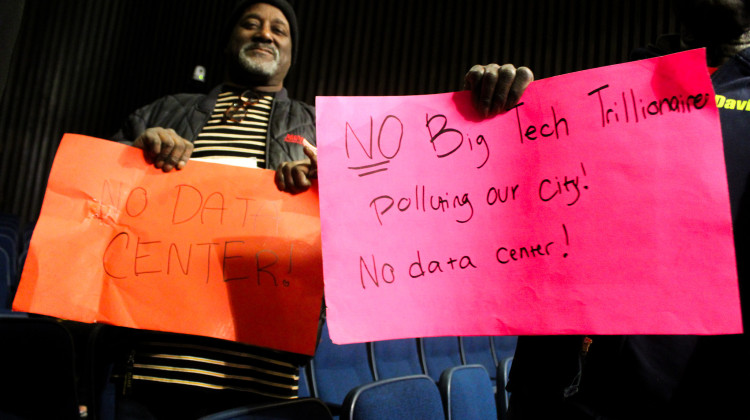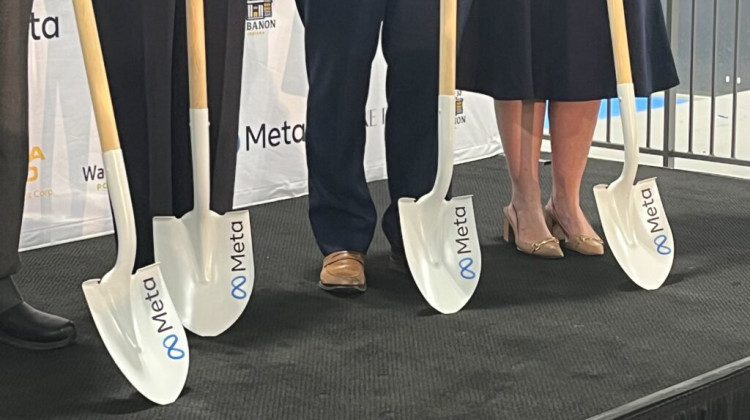By Peter Blanchard, Emily Hopkins, Mary Claire Molloy, Tyler Fenwick, Carley Lanich and Mesgana Waiss
The City-County Council voted 17-8 on Monday, Oct. 6, to adopt Mayor Joe Hogsett’s $1.7 billion budget proposal.
Two Democrats, Jesse Brown and Crista Carlino, joined the six Republicans on council to vote against the budget.
The spending plan doesn’t increase taxes, but some departments were forced to scale back their spending. Others, like the Department of Business and Neighborhood Services, increased what they charged for services.
Here are the winners and losers in the 2026 budget.
Winner: Public safety
While most departments were forced to scale back their spending by 4%, the police, fire and sheriff’s departments of Indianapolis were allowed to increase their spending by as much as 2%.
Spending for those agencies make up about 40% of the city’s budget.
As was the case last year, the 2026 budget for the Indianapolis Metropolitan Police Department includes funding for 1,743 police officers, despite there being only about 1,460 officers on staff.
Sheriff Kerry Forestal had his agency’s budget approved, despite some Democrats on the council threatening to vote it down.

The sheriff, a Democrat in his third term, has faced criticism for partnering with U.S. Immigration and Customs Enforcement to hold detainees in the local jail. The federal government pays $75 per day for each detainee.
Winner: Eviction diversion program
The Tenant Advocacy Project, which provides free legal assistance to people facing eviction, will get $1.5 million next year.
When Hogsett’s budget was introduced, the program was only set to receive $750,000. Andrew Merkley, director of the Office of Public Health and Safety, said that was about half of what the program needed.
Then, a week before the full budget was approved, a council committee added an additional $750,000 as part of a larger spending package.
The program started in 2021 and used to be funded by a combination of grants and federal pandemic relief funds. This is the first time it’s received money directly from the city.
Winner: Streets to Home
A yearslong initiative to end unsheltered and chronic homelessness received $10.2 million in funding.

Streets to Home Indy launched this summer and is led by the Coalition for Homelessness Intervention and Prevention. The program recently led to housing for 18 people living at the Leonard Street encampment in Fountain Square.
Winner: Circle City Readers
Circle City Readers — a city-run program partnering with 10 Indianapolis schools — was launched in 2023 using federal pandemic dollars.
With that support coming to an end, the Hogsett administration committed to providing $400,000 of city funds to continue the program through the end of the 2025-26 school year.
Winner: Arts funding
Indy Arts Council will receive $1.3 million next year.

It’s the same amount the organization received last year, which was used to award more than 100 grants to arts organizations and individual artists.
Indy Arts Council President Judith Thomas said at an Oct. 2 meeting that she is grateful for the allocation given the cuts to arts funding happening at the state and federal level.
In addition to city funding, Indy Arts Council is looking to secure $1 million again from the Capital Improvement Board and Bond Bank, which increased their total budget to more than $2 million in 2025.
Currently, the council has not finalized any new agreements, but Thomas said they are in conversation with leaders at the city’s municipal corporations.
Loser: Most city departments
Local governments across Indiana had to make difficult choices this year.

That’s because state lawmakers passed legislation earlier this year that provides property tax relief to homeowners at the expense of funding for government services.
As a result of that legislation, the city anticipates losing $10 million in property tax revenue next year, with that number expected to increase to nearly $20 million in 2027 and about $30 million in 2028, according to City Controller Abby Hanson.
It’s why the Hogsett administration asked most departments to trim their budgets by 4%.
“It has not been publicly stated enough about what we were under with this budget,” said Councilor Jared Evans, a westside Democrat, during the Oct. 6 council meeting. “We knew that it was going to basically be garbage.”
Loser: Schools and libraries
For more than a decade, state lawmakers gave $38 million each year to the Health and Hospital Corporation of Marion County. The municipal corporation used the money to cover the cost of medical care for uninsured and low-income patients at Eskenazi Health.
Under Gov. Mike Braun, that support was cut.
To make up for it, HHC is maximizing the amount of property taxes it can collect from Marion County residents. That will lead to a projected $16 million loss in revenue for other taxing bodies, including Indianapolis schools and libraries.
Loser: Permit seekers
It’s about to get more expensive to build a home in Indianapolis.
That’s because the Department of Business and Neighborhood Services is raising the cost of licensing and permitting fees.
For example, the cost of getting a permit to build a 2,500-square-foot home will increase from $434 to $1,050.
Most zoning violations will also carry a costlier price tag. Previously, most zoning violations carried a flat fee of $50. Now, depending on the severity of the violation, fines can run up to $325.
The increases are necessary because the cost for the department to provide enforcement and permitting is greater than the revenue it brings in, according to Hanson, who said the new rates are based on the cost of similar services in neighboring cities and counties.
Loser: Urban forest advocates
A group called Forests for Indy had been asking councilors to find $3 million in the budget for urban forest preservation.
Despite their efforts, their request was denied.

A Hogsett spokesperson previously told Mirror Indy that the capital plan for the Department of Public Works allocates $4 million for urban forest and land conservation over the next four years.
Mixed bag: Immigrant legal services
The Office of Public Health and Safety initially proposed cutting $100,000 from a legal fund for immigrants. The money supports legal organizations helping people with naturalization applications, asylum claims and deportation cases.
Advocates who protested the cut said the fund was more important now than ever — especially as the Trump administration continues to work with the Marion County Jail and opens new immigration detention centers across Indiana.
The cut was reversed during a Sept. 24 committee meeting. The budget was restored to 2025 levels.
But some councilors and advocates said funding should be increased.
“This is nothing compared to the need that exists,” said Karla Lopez-Owens, the president of the Indiana Latino Democratic Caucus.
Mirror Indy, a nonprofit newsroom, is funded through grants and donations from individuals, foundations and organizations.
Peter Blanchard covers local government. Reach him at 317-605-4836 or peter.blanchard@mirrorindy.org. Follow him on X @peterlblanchard.
Emily Hopkins is a Mirror Indy reporter focused on data and accountability. You can reach them on phone or Signal at 317-790-5268 or by email at emily.hopkins@mirrorindy.org. Follow them on most social media @indyemapolis or on Bluesky @emilyhopkins.bsky.social.
Mirror Indy reporter Mary Claire Molloy covers health. Reach her at 317-721-7648 or email maryclaire.molloy@mirrorindy.org. Follow her on X @mcmolloy7.
Mirror Indy reporter Tyler Fenwick covers housing and labor. Contact him at 317-766-1406 or tyler.fenwick@mirrorindy.org. Follow him on X @ty_fenwick and Bluesky @tyfenwick.bsky.social.
Mirror Indy reporter Carley Lanich covers early childhood and K-12 education. Contact her at carley.lanich@mirrorindy.org or follow her on X @carleylanich.
Mirror Indy reporter Mesgana Waiss covers arts and culture. Contact her at 317-667-2643 or mesgana.waiss@mirrorindy.org.
 DONATE
DONATE








 Support WFYI. We can't do it without you.
Support WFYI. We can't do it without you.